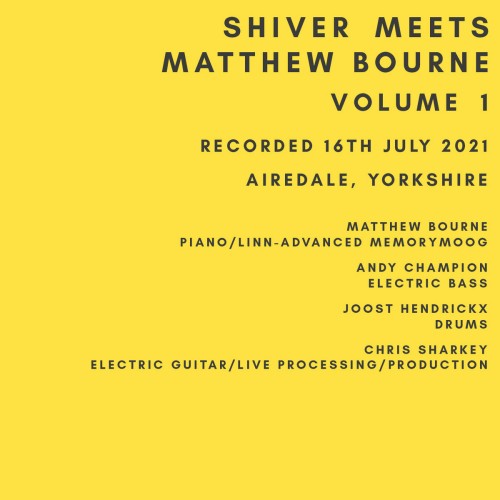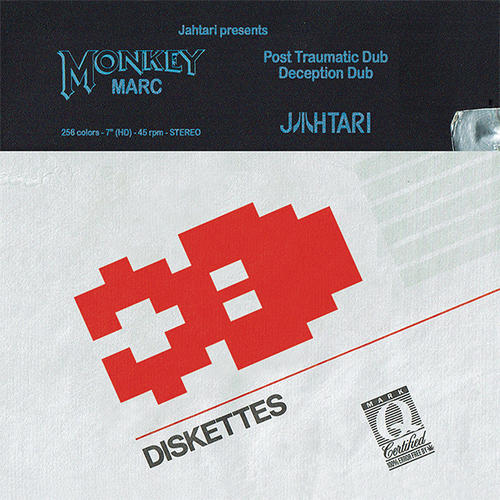The never-ending flexibility of folk-framed idioms is undoubtedly one of the music world’s undervalued gifts, with there being near-infinite creative power in the union of pastoralism and open-minded songcraft, as the following four full-length releases contest.
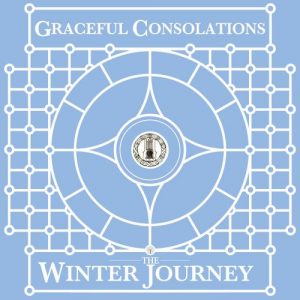 Definitely no strangers to stretching themselves into all manner of stylistic shapes, with bucolic building blocks in the foundations, are erstwhile George members Anthony Braithwaite and Suzy Mangion, latterly trading in formation as The Winter Journey.
Definitely no strangers to stretching themselves into all manner of stylistic shapes, with bucolic building blocks in the foundations, are erstwhile George members Anthony Braithwaite and Suzy Mangion, latterly trading in formation as The Winter Journey.
Whilst Graceful Consolations is not technically a box-fresh creation – given that it was in fact recorded between 2011 and 2014 with help from polymathic producer and musician Pete Philipson (Makushin, Jane Weaver, Fenella et al) – there is a kaleidoscopic crispness at play that gives the impression of it being brought into existence far more recently. Although Braithwaite is nominally at the fulcrum, at least vocally and lyrically, this is a more democratic-sounding affair than the aforementioned This Is The Sound Of The Winter Journey, with its dizzying — yet crucially not discombobulating — diversity.
Therefore, we’re taken through pared-down Pentanglisms (“Downhill” and “The Way That You Are”); scholarly nods to the wispy folk interludes of post-Syd-pre-Dark Side Of The Moon Pink Floyd (“English Estuaries” and “City Of Truro”); Gram Parsons and Emmylou Harris-style duetting (“Late Night Line”); arcane gramophone detours (“Little Consolation”); pretty ABBA-meets-Belle & Sebastian earworming (“Words First”); eerie spectral hauntings (“Bedford Falls”); and utterly majestic Yo La Tengo-meets-Saloon motorik-pop propulsions (“The Years”). Crucially, holding all it in place and taking things into transcendental trajectories are some genuinely extraordinary interlocking vocal arrangements from Braithwaite and Mangion throughout the album, marking out the release of Graceful Consolations as anything but a mere tape-cupboard excavating exercise. Wonderful stuff.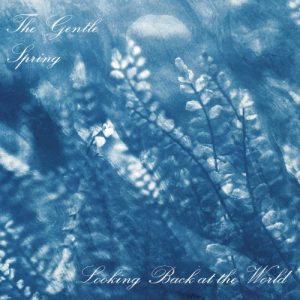 Some of us latecomers to the full story of the long-gone Sarah Records – as brilliantly brought to life in the last few years through some of Precious Recordings’ BBC session archaeology, Jane Duffus’s tremendous These Things Happen tome and a smattering of approved reissues – are certainly feeling the urge to step into a better-programmed incarnation of Sam Beckett’s Quantum Leap accelerator, to go back in time to write a few historical wrongs (or to at least stock-up on the label’s now Discogs price-inflated catalogue).
Some of us latecomers to the full story of the long-gone Sarah Records – as brilliantly brought to life in the last few years through some of Precious Recordings’ BBC session archaeology, Jane Duffus’s tremendous These Things Happen tome and a smattering of approved reissues – are certainly feeling the urge to step into a better-programmed incarnation of Sam Beckett’s Quantum Leap accelerator, to go back in time to write a few historical wrongs (or to at least stock-up on the label’s now Discogs price-inflated catalogue).
In the absence of such facilities, however, Heavenly legends Amelia Fletcher and Rob Pursey continue to run an adjacent public service platform via Skep Wax Records, in providing some space for the still-active Sarah diaspora, through their terrific multi-artist Under The Bridge compilation series and new standalone album-sized statements. Enter then, Looking Back At The World, the inaugural long-player from The Gentle Spring, a still-new enterprise marshalled by the now-Paris-based Michael Hiscock of The Field Mice.
Joined by bandmates Emilie Guillaumot (vocals, keyboards) and Jérémie Orsel (guitar), Hiscock (vocals, guitars and bass) largely leads the way, through ten beguiling chamber-folk-slanted pieces that are abundantly melodic and lushly intimate. Consequently, through for the seven tracks with Hiscock upfront, proceedings sonically sway between meditative modus operandi (“The Girl Who Ran Away” and “I Can’t Have You As A Friend”) and more stirring strumlongs (“Untouched” and the title track), all instilled with middle-age romantic backwards glances.Across the three tracks placing Guillaumot to the fore, a few different stylistic combinations arise; with the daintily sparse “Severed Hearts” imagining Isobel Campbell remoulding George Harrison’s “Isn’t It A Pity”, the piano-led tumble of “The Ashes” nodding to The Divine Comedy circa Liberation and the dreamy “Don’t Bring It Home” drifting into an ecclesiastically-skewed salute to Young Marble Giants.
Warmly familiar and rousingly rejuvenated, Looking Back At The World is a heartfelt and handsome starter statement. Carrying a connection with the younger generation of signings on the Skep Wax books — and plenty more besides — is the eponymous first LP from Mirrored Daughters on Fika Recordings. Featuring Skep Wax-affiliated sole trader Marlody, Matt Ashton (The Leaf Library, Sun Drawings), Lewis Young (The Leaf Library), Mike Cranny (Firestations) and Hannah Reeves, this supergroup-fashioned affair is driven by a fascination with the environs of Epping Forest and the sonic mulch of its creators.
Carrying a connection with the younger generation of signings on the Skep Wax books — and plenty more besides — is the eponymous first LP from Mirrored Daughters on Fika Recordings. Featuring Skep Wax-affiliated sole trader Marlody, Matt Ashton (The Leaf Library, Sun Drawings), Lewis Young (The Leaf Library), Mike Cranny (Firestations) and Hannah Reeves, this supergroup-fashioned affair is driven by a fascination with the environs of Epping Forest and the sonic mulch of its creators.
From the voice-led cohort of compositions, there are some truly captivating passages to be found. This entails transporting us through the Meg Baird-meets-Tindersticks beauty of “City Song”; the skittering harmony-loaded uplift of “The New Design”; the overlapping vocal swirl of “Unreturning Sun”; the cello-steered hypnotics of “Waiting At The Water”; and the wistful Vashti Bunyan-tinged psych-pop reverie of “An Open Door”.
Although less arresting, the wordless pieces possess a different kind of magnetism, through gamelan percussion and woodwind miasmas (“Mirror Descend”), ruralist dronescaping (“The Ambresbury Daughter”) and rudimentary pulsing ambience (“The Lanthorn Daughter”). There is a cogent argument that the gathered recordings might have benefited from being split into two EP-length offerings, to more clearly document the two distinct sides of the Mirrored Daughters sound palette. Yet taken all together, the sophisticated hodgepodge approach reaches an enduring equilibrium in the enchantingly enigmatic end product.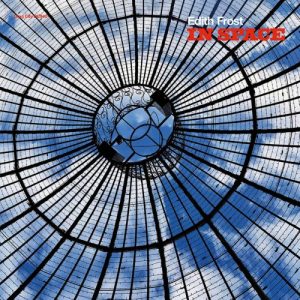 It was beginning to seem that Edith Frost’s solo career might be bookended by her two best albums – 1997’s still-sublime Calling Over Time and 2005’s criminally overlooked It’s A Game. While this may not have been a bad position from a canon-cementing point of view for her slender yet distinctive catalogue, there would have remained a sense of unfinished business, had not the very-long-in-the-works In Space just arrived via Drag City.
It was beginning to seem that Edith Frost’s solo career might be bookended by her two best albums – 1997’s still-sublime Calling Over Time and 2005’s criminally overlooked It’s A Game. While this may not have been a bad position from a canon-cementing point of view for her slender yet distinctive catalogue, there would have remained a sense of unfinished business, had not the very-long-in-the-works In Space just arrived via Drag City.
Even though Edith Frost has admirably regenerated herself for 2025 — and hopefully beyond — In Space also sustains the best character traits of her past masterworks, as its songs find their own quietly determined ways to embed themselves in your psyche, as reliable confidants and mentors.
A very welcome reappearance from one of Drag City’s most endearing survivors, all told.-Adrian-

